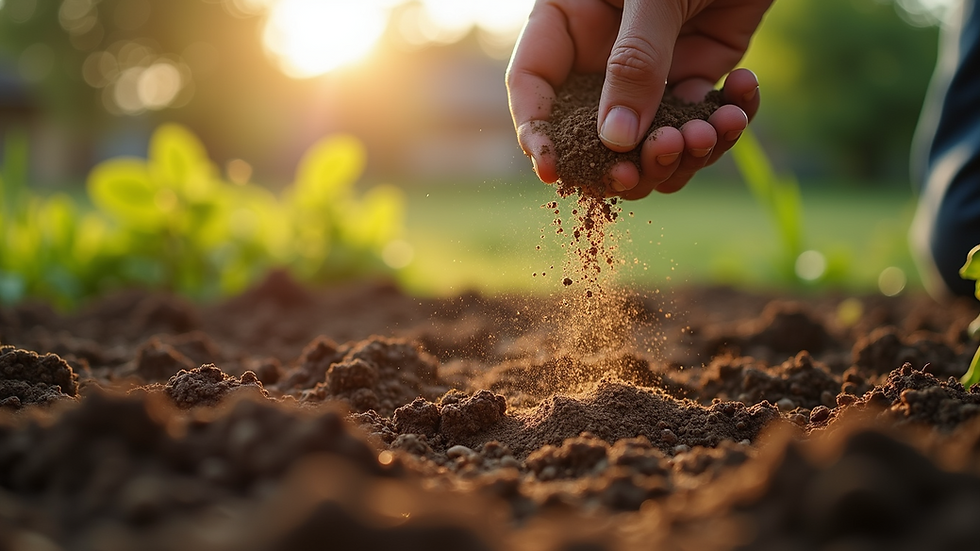Frequently Asked Questions About Plant Fertilizers
- info035788
- Aug 6, 2025
- 4 min read
Fertilizers play a crucial role in helping plants grow healthy and strong. Whether you are a beginner gardener or an experienced plant enthusiast, understanding the basics of plant fertilizers can make a big difference in your gardening success. This article answers some of the most common questions about plant fertilizers and plant food, providing practical advice and clear explanations to help you nurture your plants effectively.
What Is Plant Food and Why Is It Important?
Plant food refers to the nutrients that plants need to grow, develop, and thrive. These nutrients come from the soil, water, and fertilizers. Fertilizers are products that supply essential nutrients to plants, especially when the soil lacks them.
Plants require three primary nutrients:
Nitrogen (N): Promotes leafy, green growth.
Phosphorus (P): Supports root development and flowering.
Potassium (K): Enhances overall plant health and disease resistance.
In addition to these macronutrients, plants also need secondary nutrients like calcium, magnesium, and sulfur, as well as trace elements such as iron, zinc, and manganese.
Using the right plant food ensures your plants get the nutrients they need at the right time. This leads to better growth, higher yields, and more vibrant flowers or fruits.

Close-up view of green leaves with fertilizer granules
How Do I Choose the Right Plant Food for My Garden?
Choosing the right plant food depends on several factors:
Type of Plants: Different plants have different nutrient needs. For example, leafy vegetables require more nitrogen, while flowering plants benefit from higher phosphorus.
Soil Condition: Conduct a soil test to determine nutrient deficiencies. This helps you select a fertilizer that complements your soil.
Growth Stage: Young plants need more nitrogen for leaf growth, while mature plants may require more potassium for fruiting.
Fertilizer Form: Fertilizers come in various forms such as granular, liquid, slow-release, and organic. Each has its advantages depending on your gardening style.
For general gardening, an all purpose plant fertilizer can be a convenient choice. It provides a balanced mix of nutrients suitable for a wide range of plants.
Tips for Choosing Plant Food
Read the fertilizer label carefully to understand the N-P-K ratio.
Use organic fertilizers if you prefer natural gardening methods.
Avoid over-fertilizing, which can harm plants and the environment.

Eye-level view of garden soil with fertilizer being applied
What is the Best Fertilizer to Use for All Plants?
Many gardeners look for a single fertilizer that works well for all their plants. While no fertilizer is perfect for every plant, some products come close by offering a balanced nutrient profile.
A balanced fertilizer typically has equal or near-equal amounts of nitrogen, phosphorus, and potassium, such as a 10-10-10 or 20-20-20 formula. These fertilizers support overall plant health, encouraging strong roots, lush foliage, and abundant blooms.
Slow-release fertilizers are also excellent for all-purpose use. They release nutrients gradually, reducing the risk of overfeeding and providing steady nourishment over time.
Recommendations for All-Purpose Fertilizers
Use a balanced N-P-K fertilizer for mixed gardens with flowers, vegetables, and shrubs.
Apply according to package instructions to avoid nutrient burn.
Supplement with micronutrients if your soil test indicates deficiencies.

High angle view of balanced fertilizer granules in a scoop
How Often Should I Fertilize My Plants?
The frequency of fertilizing depends on the type of fertilizer, plant species, and growth stage.
Fast-release fertilizers: Usually applied every 2-4 weeks during the growing season.
Slow-release fertilizers: Can last 2-3 months or longer, requiring fewer applications.
Liquid fertilizers: Often used every 1-2 weeks for quick nutrient uptake.
For most garden plants, fertilizing every 4-6 weeks during active growth is sufficient. Over-fertilizing can cause nutrient imbalances and damage roots.
Practical Fertilizing Schedule
Early spring: Apply fertilizer to support new growth.
Mid-season: Fertilize to maintain vigor and encourage flowering or fruiting.
Late season: Reduce or stop fertilizing to allow plants to prepare for dormancy.
Always water plants after fertilizing to help nutrients reach the roots.
Can I Use Household Items as Plant Fertilizers?
Yes, some common household items can serve as natural fertilizers. These are often rich in nutrients and can improve soil health.
Examples of Household Fertilizers
Coffee grounds: Add nitrogen and improve soil texture.
Eggshells: Provide calcium to prevent blossom end rot in tomatoes.
Banana peels: Supply potassium and phosphorus.
Used tea leaves: Add organic matter and nutrients.
Use these items in moderation and compost them first if possible. Avoid using anything with chemicals or oils that could harm plants.
What Are the Signs of Over-Fertilizing and How Can I Fix It?
Over-fertilizing can cause several problems, including:
Leaf burn or yellowing edges.
Wilting despite adequate watering.
Excessive, weak growth.
Salt buildup in soil.
If you suspect over-fertilizing:
Flush the soil with plenty of water to wash away excess nutrients.
Stop fertilizing until the plant recovers.
Add organic matter like compost to improve soil structure.
Repot if the problem is severe and confined to container plants.
Monitoring your plants regularly helps catch issues early.
How Do Organic Fertilizers Compare to Synthetic Ones?
Organic fertilizers come from natural sources like compost, manure, bone meal, and seaweed. Synthetic fertilizers are chemically manufactured.
Benefits of Organic Fertilizers
Improve soil health and microbial activity.
Release nutrients slowly and steadily.
Less risk of nutrient runoff and pollution.
Benefits of Synthetic Fertilizers
Provide precise nutrient ratios.
Act quickly to correct deficiencies.
Often more affordable and widely available.
Many gardeners use a combination of both to balance immediate needs with long-term soil health.
Understanding plant fertilizers and plant food is essential for successful gardening. By choosing the right fertilizer, applying it correctly, and observing your plants closely, you can enjoy a thriving garden full of healthy, vibrant plants. For more detailed information and specific product recommendations, consider exploring resources like the all purpose plant fertilizer guide.
Happy gardening!



Comments